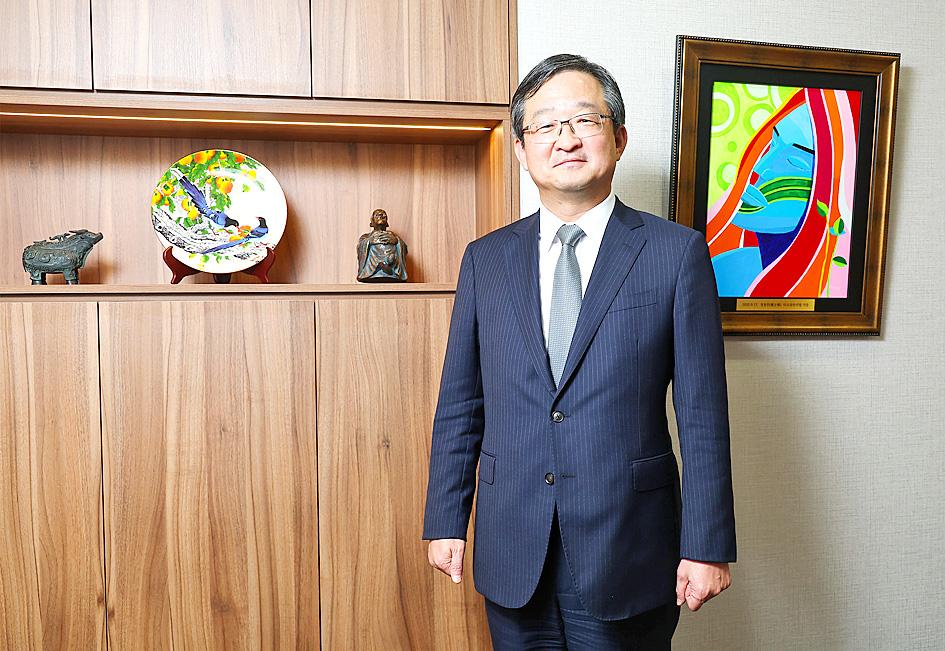South Korean Representative to Taiwan Chung Byung-won said he has been taking a more systematic approach to the exchanges between the two sides since taking up his post in December last year.
Chung made the remarks during an interview with the Central News Agency.
The two countries have always had close economic, trade and tourism ties, he said, adding that bilateral exchanges are expected to increase following the inauguration of new South Korean President Yoon Suk-yeol.

Photo: CNA
Taiwan and South Korea are each other’s fifth-largest trading partners, with bilateral trade reaching US$50.76 billion last year for annual growth of 41.98 percent, he said, citing government data.
The travel volume between the two countries was 2.5 million people before the COVID-19 pandemic in 2019, with each side being the other’s third-largest source of international tourists, Chung said.
South Korea and Taiwan are global leaders in the semiconductor industry, the former known for its high-quality memory chips, and the latter for its OEM and ODM products, he said.
South Korea and Taiwan are not only competitors in the global semiconductor industry, but are also close partners with complementary strengths, Chung said.
For instance, semiconductor-related products account for 44 percent of South Korea’s exports to Taiwan and 67 percent of Taiwan’s exports to South Korea, he said, citing data from last year.
Against this backdrop, Chung said that one of his priorities is to create a more systematic approach to supporting the ties between the two sides.
To that end, Seoul and Taipei signed a reciprocal driver’s license agreement in February, with immediate effect, to make driving easier for visitors on each side, he said.
Following the signing of a double taxation agreement in November last year, the two sides are now in talks on a potential financial cooperation pact, he said.
Those efforts are aimed at building systematic and structural support for closer bilateral exchanges on all fronts, he added.
With the expected easing of border controls in the second half of this year, Chung said he is hoping that travel between the two nations will return to pre-pandemic levels.
Chung said his office is also planning to hold a fashion show in Taipei in November, which would highlight traditional Korean clothing known as hanbok.
Next year, on the 30th anniversary of the Korean Mission in Taipei, a cultural week would be organized to celebrate the milestone, he said.
The 58-year-old said he has come to love the mountains of Taiwan, adding that he is planning a four-day climb next month to Yushan (玉山), Taiwan’s highest peak.

Chinese Nationalist Party (KMT) Chairman Eric Chu (朱立倫), spokeswoman Yang Chih-yu (楊智伃) and Legislator Hsieh Lung-chieh (謝龍介) would be summoned by police for questioning for leading an illegal assembly on Thursday evening last week, Minister of the Interior Liu Shyh-fang (劉世芳) said today. The three KMT officials led an assembly outside the Taipei City Prosecutors’ Office, a restricted area where public assembly is not allowed, protesting the questioning of several KMT staff and searches of KMT headquarters and offices in a recall petition forgery case. Chu, Yang and Hsieh are all suspected of contravening the Assembly and Parade Act (集會遊行法) by holding

PRAISE: Japanese visitor Takashi Kubota said the Taiwanese temple architecture images showcased in the AI Art Gallery were the most impressive displays he saw Taiwan does not have an official pavilion at the World Expo in Osaka, Japan, because of its diplomatic predicament, but the government-backed Tech World pavilion is drawing interest with its unique recreations of works by Taiwanese artists. The pavilion features an artificial intelligence (AI)-based art gallery showcasing works of famous Taiwanese artists from the Japanese colonial period using innovative technologies. Among its main simulated displays are Eastern gouache paintings by Chen Chin (陳進), Lin Yu-shan (林玉山) and Kuo Hsueh-hu (郭雪湖), who were the three young Taiwanese painters selected for the East Asian Painting exhibition in 1927. Gouache is a water-based

Taiwan would welcome the return of Honduras as a diplomatic ally if its next president decides to make such a move, Minister of Foreign Affairs Lin Chia-lung (林佳龍) said yesterday. “Of course, we would welcome Honduras if they want to restore diplomatic ties with Taiwan after their elections,” Lin said at a meeting of the legislature’s Foreign Affairs and National Defense Committee, when asked to comment on statements made by two of the three Honduran presidential candidates during the presidential campaign in the Central American country. Taiwan is paying close attention to the region as a whole in the wake of a

OFF-TARGET: More than 30,000 participants were expected to take part in the Games next month, but only 6,550 foreign and 19,400 Taiwanese athletes have registered Taipei city councilors yesterday blasted the organizers of next month’s World Masters Games over sudden timetable and venue changes, which they said have caused thousands of participants to back out of the international sporting event, among other organizational issues. They also cited visa delays and political interference by China as reasons many foreign athletes are requesting refunds for the event, to be held from May 17 to 30. Jointly organized by the Taipei and New Taipei City governments, the games have been rocked by numerous controversies since preparations began in 2020. Taipei City Councilor Lin Yen-feng (林延鳳) said yesterday that new measures by